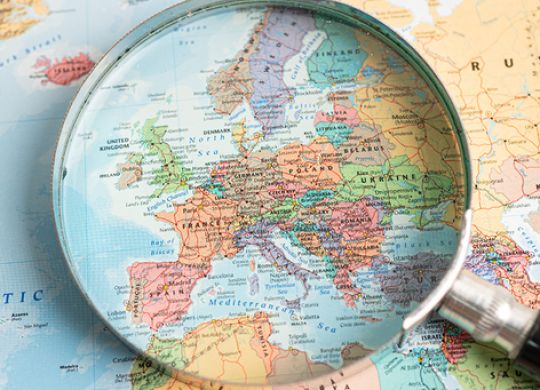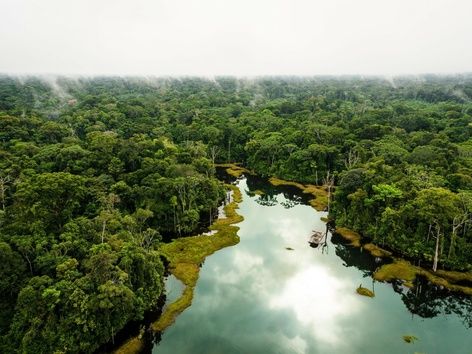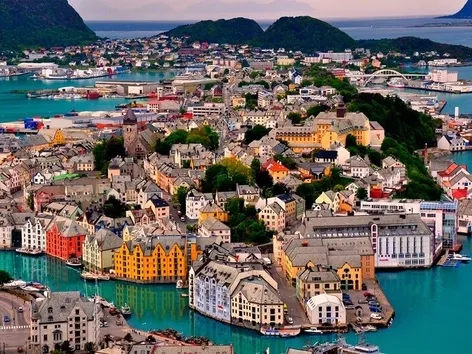Top 10 most tolerant countries in Europe 2024: current rating

Unfortunately, even in the twenty-first century, some members of the LGBTQ+ community still face harassment and bullying. Therefore, when moving, it is very important to choose a country with progressive views and a high level of awareness, where society shows a tolerant attitude towards everyone. Learn more about the TOP 10 most tolerant countries in Europe in 2024
When choosing a country for relocation, it is important for members of the LGBTQ+ community to consider the level of awareness and tolerance in society. Europe, with its progressive views, offers several countries where everyone can feel comfortable and protected.
In 2024, some European countries continue to lead the way in LGBTQ+ rights, providing a high level of support and acceptance. Visit World has prepared a ranking of the most LGBTQ+ friendly countries, according to the Rainbow Map created by ILGA. This will allow you to choose the safest and most favorable destination for your move.
Which European countries are the most friendly to LGBTQ communities?
In 2024, we analyzed the top 10 countries that are leading in the field of LGBTQ+ rights and identified the main factors that determine their places in the ranking.
The following important aspects can be distinguished among these factors:
1. Legislative recognition of same-sex marriages and civil partnerships;
2. The right to joint adoption of children by same-sex couples;
3. Access to reproductive technologies such as artificial insemination and IVF;
4. Prohibition of conversion therapy;
5. Rights to gender transition and self-determination;
6. Laws protecting against discrimination on the basis of gender identity, sexual orientation and expression in employment, housing and access to services;
7. The possibility of blood donation by members of the LGBTQ+ community.
We also identified areas that need to be improved to create a more inclusive environment for everyone.
Thus, the ranking of the most tolerant European countries for the LGBTQ+ community in 2024 is as follows:
1. Malta
2. Iceland
3. Belgium
4. Spain
5. Denmark
6. Greece
7. Luxembourg
8. Norway
9. Portugal
10. Germany
Malta
Malta is a great example of how the size of a country does not determine its impact on society and human rights. Although it is a small island in the Mediterranean, Malta has made impressive progress in achieving equality and protecting the rights of the LGBTQ+ community.
In 2016, Malta became the first country in the European Union to legislate against conversion therapy, a significant step towards recognizing and respecting the rights of LGBTQ+ people. This achievement is reinforced by another important legislative decision - in 2014, same-sex partnerships were recognized, and in 2017, Malta legalized same-sex marriage.
In addition, Malta has become one of the few countries in the world to protect the rights of the LGBTQ+ community at the constitutional level. In 2004, a national ban on discrimination based on gender identity and sexual orientation was introduced, further strengthening equality in the country. However, despite this progress, there is still a need to improve legislation, in particular with regard to access to health services for HIV-positive people and the incorporation of the Equality Act.
The first Pride parade in Malta took place in 2004, and since then, the event has grown significantly: in 2023, the Pride gathered more than 38 thousand participants. In addition, in 2020, Malta joined the UN Core Group on LGBTI Issues, which demonstrates its active position in the international arena in the fight against discrimination and violence against the LGBTQ+ community.
Iceland
Iceland deservedly occupies one of the leading places in the list of countries that ensure equal rights for the LGBTQ+ community. Already in 1996, Iceland became one of the first European countries to recognize same-sex partnerships. The legalization of same-sex marriage took place in 2010, which was an important step towards equality. Although priests can refuse to perform ceremonies based on personal beliefs, this does not create obstacles for couples, as they are given the opportunity to seek another priest.
Since 2015, the Church of Iceland has officially supported same-sex marriage, welcoming such couples to its institutions. As early as 2004, 87% of Icelanders expressed support for same-sex marriage, which is significantly higher than in the United States at that time.
In 2006, Iceland took another important step by granting same-sex couples the right to adopt and equal access to IVF. Legislative changes in 2012 simplified the procedure for changing the name and gender for transgender people, demonstrating a progressive approach to human rights.
It is important to note that in Iceland, members of the LGBTQ+ community have significant representation in parliament and the media, which contributes to the openness and tolerance of society. One prominent example is Johanna Sigurdardottir, the country's first openly queer leader.
However, Iceland still needs to take steps to improve access to HIV testing and treatment, as well as to increase understanding of different gender and sexual orientations. The ban on blood donations by men who have sex with men remains one of the obstacles to equality. Although this topic is being actively debated, many hope that it will be abolished in the near future.
To learn more about the conditions for obtaining a residence permit in Iceland in 2024, please follow the link.
Belgium
Belgium was one of the first countries in the world to decriminalize homosexuality back in 1795, which was the result of the French invasion and the implementation of the French Penal Code, which legalized homosexuality in 1791. Although this decriminalization was temporarily revoked for 20 years during the Christian Party's rule, it was reinstated in 1985 and is still in effect today.
Belgium is also one of the first countries to recognize the rights of same-sex couples. In 2000, the country officially recognized same-sex partnerships, and three years later it became the second country in the world to legalize same-sex marriage, following the example of the Netherlands.
In 2003, Belgium introduced a ban on discrimination based on sexual orientation in the labor market, housing and services. In 2014, gender identity and expression were added to this list. Since 2006, same-sex couples have been granted the right to adopt and undergo IVF treatment on equal terms with heterosexual couples.
In 2022, Belgium took another progressive step when the bishops' conference published a liturgical document blessing same-sex unions. Conversion therapy was officially banned in 2023.
Belgian society generally supports equal rights for the LGBTQ+ community, which is reflected in the organization and participation in one of the largest annual pride events in Europe. The Brussels neighborhood of Saint-Jacques has become known as one of the most queer-friendly neighborhoods in Belgium, with many bars and businesses supporting the LGBTQ+ community.
Spain
Spain's history in the struggle for equality and tolerance of the LGBTQ+ community has been difficult. Homosexuality was first decriminalized in the country back in 1932, but with the rise of the Franco regime, the persecution of LGBTQ+ people became commonplace again. It was only after the fall of the Franco regime in 1979 that Spain re-decriminalized homosexuality and equalized the age of consent for same-sex and different-sex couples.
Catalonia became the first region to recognize same-sex partnerships in 1988, paving the way for other parts of the country. Madrid joined the movement only in 2001. In 2005, Spain became one of the first countries in the world to legalize same-sex marriage and provide equal adoption rights to all couples, regardless of sexual orientation.
Today, Spain is one of the most progressive countries in the world in terms of LGBTQ+ rights, ranking third in terms of the number of citizens who support same-sex marriage and equal adoption rights. In 2023, the country took another step forward by banning conversion therapy. Madrid, famous for its queer neighborhood of Chueca, and Barcelona, with its popular LGBTQ+ neighborhood of Eixample, are now important centers for the LGBTQ+ community in Spain.
In our previous article, we told you that Spain plans to close the Golden Visa program.
Denmark
Denmark continues to be a leader among the most tolerant countries in Europe in 2024, setting an example in ensuring equality for the LGBTQ+ community. The country has a long history of progressive change, having launched the world's first registered partnerships for same-sex couples back in 1989. And ten years later, Denmark became the first country to recognize two legal parents of the same sex, making a significant step forward in the rights of LGBTQ+ families.
In 2006, the country granted lesbian couples equal access to artificial insemination services in public hospitals. A few years later, in 2010, same-sex couples were granted equal rights to adoption, confirming Denmark's status as one of the most progressive societies in the world. The Danish government continues to support LGBTQ+ families today: starting in 2022, lesbian mothers no longer need to prove how their child was conceived, as their partner is automatically recognized as the legal parent.
As for the rights of transgender people, Denmark took another important step in 2014 by allowing legal gender reassignment based on self-determination, without the need for medical intervention. Despite all the progress, issues of safety and discrimination still remain. For example, a significant number of transgender people still face hate crimes.
To overcome these problems, the Danish government has introduced the second national action plan for LGBTQ+ people, which includes 39 initiatives aimed at improving security and equality. Particular attention is paid to creating a safe environment for queer students, which includes additional training for teachers to support and raise awareness of the rights of the LGBTQ+ community.
Greece
Greece has shown significant progress in the area of equality, moving up three places from last year's ranking, thanks to the legalization of same-sex marriage in early 2024. This achievement was a significant step for the country, making it the first in southeast Europe to introduce such legislation. This important step allowed Greece to take its rightful place among the most tolerant countries in Europe.
Although Greece decriminalized same-sex relationships relatively late, in 1951, recent years have seen significant changes. In 2015, same-sex partnerships were recognized, and in 2016 legislation was introduced to protect the rights of the LGBTQ+ community in the labor market.
In 2017, the process of legal gender reassignment became simpler and more transparent, allowing people to determine their gender identity independently. In 2018, Greece equalized adoption rights for same-sex and opposite-sex couples, which was another important step towards equality.
Greece's progress continued: in 2022, conversion therapy was banned and men who have relationships with other men were allowed to donate blood without any restrictions. Although religion remains an important part of Greek culture, the changes that have taken place indicate the country's steady movement towards a more equal and tolerant society.
Planning a trip or move abroad? An important part of a successful trip is an insurance policy, as it guarantees high-quality medical care anywhere in the world and can protect you from unnecessary expenses while travelling. You can buy insurance from trusted agents on the Visit World portal.
Luxembourg
Luxembourg, like Belgium, was influenced by France in the nineteenth century, which led to the early decriminalization of same-sex relationships under the French Penal Code of 1794. However, in 1971, the age of consent for same-sex couples was temporarily raised to 18, while for opposite-sex couples it remained at 16. This restriction was lifted in 1992, restoring equality in this area for the LGBTQ+ community.
Luxembourg is a country with deep traditional Christian values that influence its social culture. However, the desire for equality has led to Luxembourg being ranked among the ten most tolerant countries in Europe in 2024, taking the honorable 7th place.
Same-sex partnerships have been officially recognized in Luxembourg since 2004, and in 2015, same-sex couples were granted the right to marry and adopt children on equal terms with heterosexual couples. An important event was the fact that the current Prime Minister of Luxembourg, Xavier Bettel, married his partner, becoming the first leader in the European Union to take such a step.
In 2018, Luxembourg introduced the right to legal gender reassignment based on self-determination, which was another significant step towards equality. Since 2021, men who have sex with other men have been allowed to donate plasma without restrictions, and after 12 months of no sexual contact, they can donate blood.
Luxembourg's legislation prohibits discrimination on the basis of sexual orientation, gender identity and expression in all areas of life, including the labor market, health care and the provision of goods and services. According to a 2019 survey, 87% of Luxembourgers support equal rights for the LGBTQ+ community, which indicates significant progress towards tolerance and equality in the country.
Norway
Norway was quite late in lifting its ban on homosexuality, taking this step only in 1972. However, ten years later, in 1981, the country made up for lost time by becoming one of the first countries in the world to adopt an anti-discrimination law aimed at protecting the rights of people regardless of their sexual orientation.
In 1993, Norway recognized same-sex partnerships, but same-sex couples were granted the right to marry only in 2009. In the same year, they gained equal rights to adopt children and access to artificial insemination procedures. An important step in the field of equality was the recognition of the legal father of a pregnant woman's partner from the moment of conception, which ensures equal rights and responsibilities.
In 2016, Norway passed a law that allows transgender people to change their legal gender on the basis of self-determination, making it one of the first countries in Europe to introduce such legislation. This law applies to people over the age of 16, and parental consent is required for children aged 6 to 16.
It is important to note that the age of consent in Norway is set at 16 for all sexual orientations and genders. Since 2017, men who have had sex with other men have been able to donate plasma and blood after a certain period, which this year was reduced to six months.
One of the challenges in the Norwegian system is the limited access to gender-affirming medical care. Only one in four patients can receive such care, and a psychiatric diagnosis is required to access treatment.
To learn more about the TOP 10 most unfriendly countries for expats in 2024, please follow the link.
Portugal
The LGBTQ+ movement in Portugal began in 1974 with the publication of a manifesto for the liberation of sexual minorities in the Diario de Lisboa newspaper. Since then, the country has come a long way in ensuring equal rights for the LGBTQ+ community. Homosexuality was decriminalized in 1982, which was an important step in protecting minority rights.
In 1999, the first Equality March took place in Lisbon, symbolizing the growing support for LGBTQ+ rights. In the same year, same-sex unions were recognized, and ten years later, in 2010, same-sex couples were granted the right to marry. Portugal also became one of the first countries to include a ban on discrimination based on sexual orientation in its Constitution in 2004.
In 2011, the government passed a law on gender identity that greatly simplified the process of changing gender and name for transgender people, becoming one of the most progressive laws of its kind in the world. This initiative has continued to expand the rights of the LGBTQ+ community, with same-sex couples gaining equal rights to adoption and IVF treatment in 2016.
Despite significant progress, surrogacy remains illegal for same-sex partners and is only allowed in extreme cases for heterosexual couples. As of 2019, 80% of Portuguese citizens expressed support for equal rights for the LGBTQ+ community. The lifting of restrictions on blood donation in 2021 and the ban on conversion therapy in 2023 were further steps towards ensuring equality in the country.
Germany
The history of the struggle for equality for the LGBTQ+ community in Germany has been complex and intense. Homosexuality was decriminalized quite early for European countries - in 1871. During the period of the Weimar Republic (1920s and 30s), tolerance for LGBTQ+ people increased significantly, but during the Nazi regime, this community was brutally persecuted.
Changes came during the Cold War: in 1968, East Germany decriminalized same-sex relationships, and in 1969, West Germany did the same. In the new millennium, LGBTQ+ rights have expanded significantly, starting with the recognition of same-sex partnerships in 2001. This right was extended in 2017, when same-sex couples were granted the right to marry and equal rights to adopt.
Despite significant progress, some issues remain open, including the legal regulation of IVF for lesbians, which still lacks clear legal regulation. Discrimination on the basis of gender identity and sexual orientation is prohibited at the national level in employment and service provision, although some regional differences still exist.
Since 2017, Germany has recognized a third gender, allowing intersex people to legally not choose between the traditional male and female divide. Also in 2019, conversion therapy was banned for minors and partially for adults.
Work is currently underway on a law on self-determination that will allow transgender, intersex, and non-binary people to legally change their gender on the basis of self-determination. The law will come into force in November 2023, providing an opportunity to apply for gender reassignment in three months.
We remind you! Every year, Munich hosts the largest beer festival in the world at the end of September, which attracts more than 6 million tourists. Read more about the schedule, tents, and program of the Oktoberfest in 2024.
Are you planning to travel or move abroad? An important component of a successful trip is a travel insurance policy, because it guarantees the provision of high-quality medical care in any corner of the world and is able to protect you from unnecessary expenses during the trip. You can buy insurance from verified agents on the Visit World portal.
Products from Visit World for a comfortable trip:
Travel guide for 200 countries;
Legal advice from a local specialist on visa and migration issues;
Travel insurance around the world (please select the country of interest and citizenship to receive services);
Medical insurance all over the world.
We monitor the accuracy and relevance of our information, so if you notice any errors or inconsistencies, please contact our hotline.
Recommended articles
3 min
Education
Luxembourg is the perfect place to get a multilingual and multicultural learning experience. Find out more about universities, study programs and how to apply to universities in Luxembourg for international students in 2025
12 Aug. 2024
More details3 min
Travels
The safest countries in Latin America in 2025: a detailed overview
If you are always looking for new travel experiences, Latin America should definitely be on your bucket list. Thanks to its rich cultural heritage, stunning natural beauty, and colourful cuisine, this continent attracts millions of tourists from all over the world. However, safety is the most important criterion when choosing a travel destination. Find out more about the safest countries in South America
12 Jul. 2025
More details2 min
Popular
Best city in the world to live in 2025: who is in the leaders?
Every year, The Economist magazine publishes a global ranking of the comfort of living, which is determined by analyzing benchmarks in 5 categories. Find out how the ranking is made and which cities are the best in 2025
20 Oct. 2025
More details3 min
Events
Munich Oktoberfest 2025: history and program of the festival, tents and other important details
Every year, Munich hosts the largest beer festival in the world at the end of September, attracting more than 6 million tourists. Find out more about the schedule, tents, and program of the Oktoberfest 2025
30 Aug. 2025
More detailsAll materials and articles are owned by VisitWorld.Today and are protected by international intellectual property regulations. When using materials, approval from VisitWorld.Today is required.
